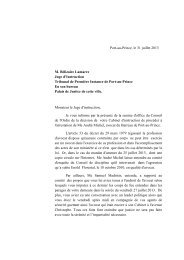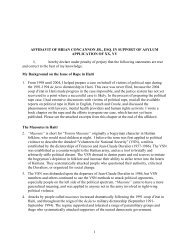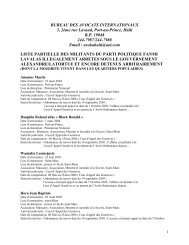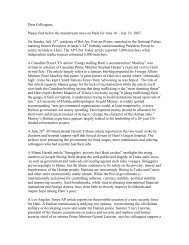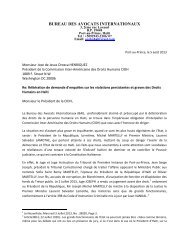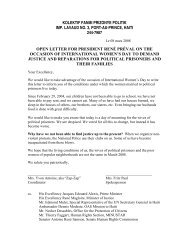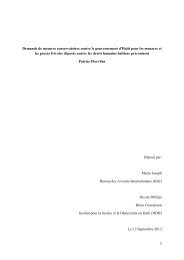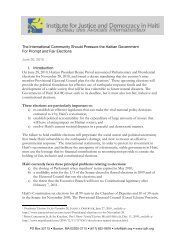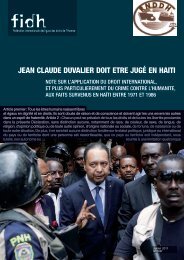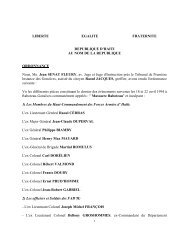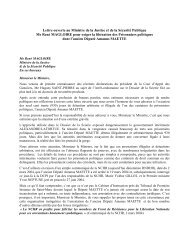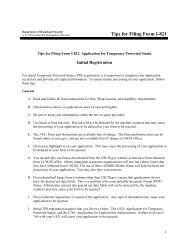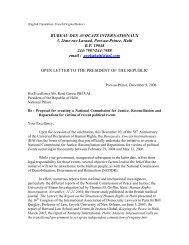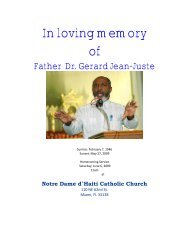Peacekeeping without Accountability - Yale Law School
Peacekeeping without Accountability - Yale Law School
Peacekeeping without Accountability - Yale Law School
- No tags were found...
You also want an ePaper? Increase the reach of your titles
YUMPU automatically turns print PDFs into web optimized ePapers that Google loves.
Chapter IIIThe Requirement of a Claims CommissionBy failing to hold itself accountable for causingthe cholera outbreak in Haiti, the United Nationsviolates the very principles of accountability andrespect for law that it promotes worldwide. Underinternational human rights and humanitariannorms, which Chapters IV and V demonstrate applyto all U.N. member states as well as the organizationitself, the U.N. is accountable through appropriatemechanisms for certain wrongs it commits. Thisbedrock principle is reflected in every SOFA the U.N.has signed with countries hosting peacekeepersover the past two decades. These SOFAs requirethe creation of standing claims commissions tohear claims against U.N. peacekeepers and are oneimportant measure for ensuring U.N. accountability.However, in practice, the U.N. has refused torespect this principle of accountability, despiteits place in the U.N.’s own governing law and itscontractual agreements. Although the U.N. haspromised a standing claims commission in theSOFA, it has never once honored this obligationin Haiti or anywhere else in the world, despitehaving entered into 32 such agreements since 1990.As a result, a meaningful mechanism to ensurepeacekeeper accountability has been rendereda nullity.The introduction of cholera by U.N. peacekeepersin Haiti exemplifies why such a standing claimscommission is a vital part of any peacekeepingmission: Because U.N. peacekeepers enjoy immunityin courts of law, a claims commission is often theonly avenue an injured civilian may have to redressinjury caused by U.N. peacekeepers.This chapter describes the U.N.’s obligation—in convention, charter, and contract—to holditself accountable for wrongs it commits. In thepeacekeeping context, the U.N. is required toestablish adequate accountability mechanismsto address wrongs committed by peacekeepers.However, the U.N. routinely veers from theseobligations, including the explicit provisionsin SOFAs mandating that it create claimscommissions and fulfill the accountabilityrequirement. Instead, in the rare instances whenthe U.N. has taken any remedial steps for itspeacekeepers’ wrongdoing, the U.N. has relied ondeficient, ex post substitutes in which it sits asboth defendant and judge. Establishing a standingclaims commission would address cholera victims’claims in an unbiased and meaningful manner,and it constitutes one step the U.N. must take touphold its obligations of accountability.A. The U.N. Charter and the GeneralConvention Reflect a Bedrock Principleof Limited Immunity.Although the U.N. enjoys immunity for officialaction, this immunity does not mean impunity.On the contrary, the same legal instruments thatconfer the U.N. with immunity contemplate thecreation of accountability mechanisms to ensurethat those injured by the organization will receiveadequate redress.Both the U.N. Charter and the Conventionon the Privileges and Immunities of the UnitedNations (General Convention) contemplate a limitedimmunity checked by appropriate accountabilitymechanisms. The U.N. Charter recognizes that theorganization and its representatives “shall enjoy. . . such privileges and immunities as are necessaryfor the fulfillment of its purposes.” 161 Thus, the plainlanguage of the Charter qualifies the scope oforganizational immunity. While the Charterimplies that the organization’s immunity is notunbounded, the General Convention makes thisexplicit. Like the Charter, the General Conventiongenerally immunizes the U.N. from legal process. 162However, Section 29 of the General Convention,which is titled “Settlement of Disputes,” providesthat the United Nationsshall make provisions for appropriate modes ofsettlement of: disputes arising out of contractsor other disputes of a private law character towhich the United Nations is a party; disputesinvolving any official of the United Nationswho by reason of his official position enjoys27 the requirement of a claims commission



